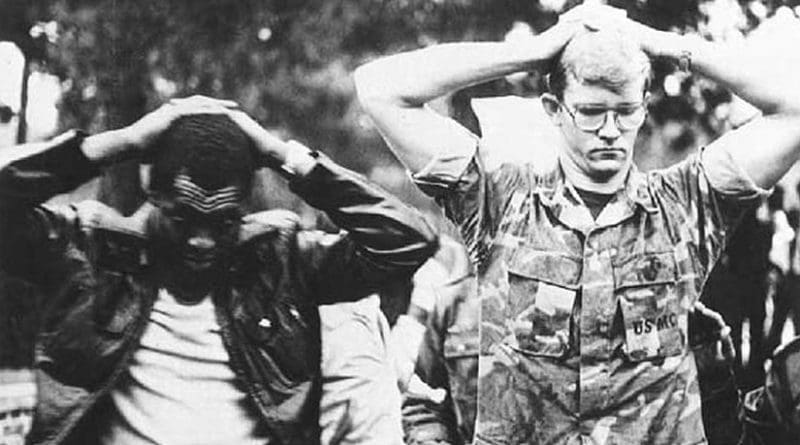Hostage Crisis Set The Tone For Islamic Republic’s Rule – OpEd
By Arab News
By Dr. Majid Rafizadeh*
Iranian politicians and state-controlled Persian media outlets this week celebrated the 40th anniversary of the taking of the US Embassy in Tehran. The Islamic Republic broke international laws by instigating the 1979 hostage crisis, in which the Iranian regime detained and humiliated 52 Americans and did not release them for 444 days — the longest hostage-taking in modern history.
The crisis ought not to be viewed as an isolated or aberrant incident when examining the four-decade history of the Islamic Republic, its foreign policy and US-Iranian relations. It gave Iran’s hard-liners, ultra-conservatives and Principlists the platform to consolidate their power. By taking 52 Americans hostage, the Islamic Republic declared to the international community its core revolutionary principles, which include anti-Americanism, the pursuit of hegemonic ambitions and the willingness to break international laws and norms in order to advance the regime’s parochial interests.
The then-newly established theocratic government evidently desired to project the power it had recently acquired. From the Iranian leaders’ perspective, their hostage-taking policy was successful, as they had scored a victory against their new enemy, which it called the “Great Satan.” Minutes after President Ronald Reagan’s inauguration on Jan. 20, 1981, Iran releasedthe hostages. It was obvious that Iran’s move to engineer the hostage crisis and President Jimmy Carter’s inability to bring the American citizens home was one of the reasons for his defeat in the presidential election of 1980.
Several factors demonstrate that hostage-taking remains an indispensable part of Iran’s political establishment. Not only has the regime never offered an apology for the 1979 hostage crisis or any of its subsequent hostage-taking efforts, but those behind the crisis now hold senior positions after being promoted by both the hard-liners and the so-called moderates. They include Masoumeh Ebtekar, known as “Sister Mary,” who was the spokeswoman for the hostage-takers and is now Iran’s vice president for women and family affairs; Hamid Abutalebi, the political adviser to President Hassan Rouhani and who was the president’s candidate to be Iran’s representative to the UN; Hossein Sheikholislam, who is adviser to Foreign Minister Mohammed Javad Zarif; Mohammad-Ali “Aziz” Jafari, who was commander of the Islamic Revolutionary Guard Corps (IRGC) and is now in charge of the Baqiollah Cultural and Social Headquarters; and IRGC Brig. Gen. Hossein Dehqan, who was defense minister in Rouhani’s first term from 2013 to 2017 and is currently adviser to Supreme Leader Ali Khamenei on defense industries and army support.
While, four decades ago, the Iranian regime took hostages mainly for political gain and to consolidate its power, it now takes foreign hostages as pawns to extract economic concessions and obtain geopolitical and financial gain. Tehran also uses hostages as a tool to silence the opposition, as well as to pressure the West into ignoring its military adventurism, violations of international law, nuclear proliferation and testing of ballistic missiles.
International diplomacy and appeasement have not changed this core character of the Islamic Republic. For example, the Obama administration reached out to the theocratic establishment and sealed the 2015 nuclear deal, lifting US sanctions and helping to remove four rounds of UN sanctions against Tehran. The argument for these concessions was that they would inspirethe Islamic Republic to change its malignant behavior, and that the resulting freedoms would trickle down to the ordinary people. But Tehran only proceeded to take more Americans and Europeans as hostages. For instance, in 2016, it seized two US Navy boatsand their crews. Iran currently holds several foreign citizens as hostages in its prisons.
The response to such belligerence cannot simply be further appeasement. That route has been tried and has failed. The international community can see first-hand the consequences of this approach.
This pattern of hostage-taking and disregard for diplomacy and international standards has continued and escalated in the last four decades, as it has become a core pillar of this rogue state’s foreign policy and a crucial tool for the ruling mullahs to strengthen their hold on power and ensure the regime’s survival.
Over the last four decades, the taking of hostages, blackmail, and defiance of international laws have come to be the key underlying characteristics of Iran’s political establishment. As long as the ruling mullahs are in power, Tehran will not alter its character. If the international community submits to Tehran’s blackmailing and hostage-taking game by accepting its terms, it will only embolden and empower the regime’s hard-liners.
- Dr. Majid Rafizadeh is a Harvard-educated Iranian-American political scientist. He is a leading expert on Iran and US foreign policy, a businessman and president of the International American Council. Twitter: @Dr_Rafizadeh

